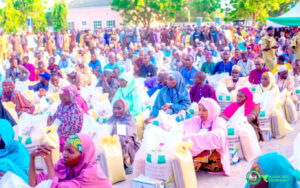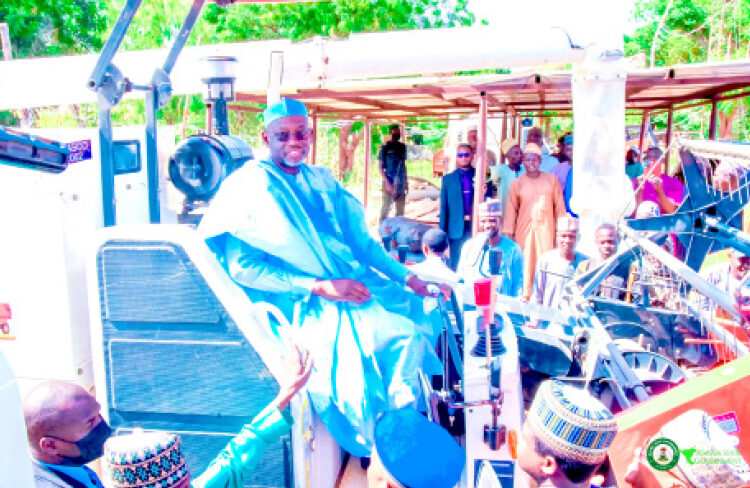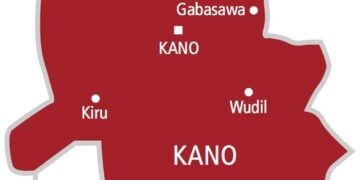Though well-intentioned, the removal of fuel subsidy, floating of the naira, and other economic policies of the current administration have adversely impacted the citizens.
Before removing the fuel subsidy, there was much anticipation of its adverse consequences on Nigerians’ social and economic lives. As should be expected, it has engendered a sharp rise in petroleum prices, which has had attendant consequences on the cost of foodstuffs and other essentials. Amid inflation, this rise in the cost of essential services has negatively impacted the citizens’ purchasing power.
Governments at different levels have devised measures to assuage the masses’ suffering, but the Jigawa state governor, Malam Umar Namadi (Danmodi)’s approach appears unique, more robust, and multi-dimensional.

While others focused merely on palliative care, the Jigawa state government looked beyond that and adopted a tactful approach encompassing palliative care and capacity building for economic resilience, sustainable self-reliance, growth, and development.
The Jigawa palliative approach included direct and indirect cash, foodstuffs, Agricultural loans, Scholarship, Supply of farm implements and other interventions that had a direct bearing on the socio-economic plight of the common man.
Hundreds of thousands of people in the State have benefited from the various social protection and welfare programs initiated and implemented over the last 15 months to ease the economic situation in the state.
While justifying his administration’s decision to adopt a multi-sectoral approach to tackling the myriads of challenges facing the citizens, especially arising from the subsidy removal, Governor Namadi stated that one of the first challenges his government had to grapple with was the bitter outcomes of some federal economic policies.
Governor Namadi noted that even though these measures are necessary to avert a fiscal crisis, stabilize the national economy, and put it on a sustainable development path, their impacts on citizens are excruciatingly hard.
To alleviate the masses’ suffering the state government “initiated social security and welfare programs to mitigate the economic trail situation.”
“We promised to continue supporting our people without limitations in scope until the situation and economic conditions stabilize and ambitious growth and development goals are achieved,” Governor Namadi stated.
Auwal Danladi Sankara is the commissioner for Special Duties. He said over 3 million people have benefited from various interventions, which continue in different phases and are primarily cash and in-kind.

“In the first batch of the palliative, the state distributed food items and cashed them, including 47,410 bags of Rice, 33,339 cartoons of spaghetti, 8,303 bags of Maize, and N1,080,000,000 cash.
“Under the framework, N40 million was allocated to each of the 27 local governments and distributed to 1,000 youth, 1,000 Women, 1,000 old age, and 1,000 physically challenged people. Every person receives a minimum of N10,000 each.
“Over 729,000 to 900,000 people have directly benefited from the 2023 Ramadan feeding and other palliatives distributed during the holy month, which was the first of its kind in the state”, he added.
In the aftermath of this year’s flood disaster in the state, over 34,000 households were supported with relief materials and other empowerment packages. In appreciation of the state effort, various partners, corporate companies, and individuals equally delivered palliatives and relief materials to the people of the state.
Interestingly, the state approved N3 billion in agricultural loans for civil servants, and over 27,000 intending beneficiaries have applied in the first batch. A record from the state Head of Civil Service office shows that 8,700 workers have accessed the loan.
The Agri Loan Initiative aimed to empower civil servants with more income sources, tackle economic challenges, and boost the country’s food security.
The loan package comprises 250,000 Naira for millet, sorghum, and sesame production. This will cover the cost of inputs consisting of 3 bags of NPK and 1 bag of Urea per hectare and the provision of assorted chemicals and pesticides. The balance of the money will be provided to cover operational costs.
For civil servants cultivating rice, the package is up to 500,000 Naira to cover the costs of 6 Bags of NPK and 3 bags of Urea per hectare, assorted chemicals and pesticides, and a cash balance to cover the cost of other farm operations.
Over 35,000 rural farmers were also given different empowerment packages, mainly seeds and other farm inputs, to boost their production and enhance their livelihoods.
The state government also signed an N 6 billion Memorandum of Understanding (MOU) with the Bank of Industry to enhance the state’s Small and Medium Enterprises (SMEs).
The partnership, which is the biggest the BON has ever had with any state government, was designed to provide accessible and affordable loans to SMEs, including rural farmers and women, to boost their production in line with the government’s 12-point agenda.
Also, to accelerate growth in food production and job creation, the loan of One Billion Naira (N1,000,000,000.00) only was approved by the Jigawa Agricultural Supply Company (JASCO) for the supply of modern and affordable farm implements, including procurement of 67 units of Tractors for supporting Mechanization of farming in the state.
In the third component of the palliative, over 10,000 people were given N50,000 each to support their businesses, while another 5,000 people with small and medium enterprises were given a grant of a minimum of N100,000 each.
In the fourth component of the palliative, One Hundred and sixty-seven million twenty-four thousand nine hundred and fifty Naira (N167,024,950.00) was given to some less privileged undergraduate students to settle their registration fees.
For the fifth component, Governor Namadi approved N1.920 billion for the establishment of 300 Micro Retailers Provision Shops known as ” Palliative Shops” across 287 political wards. These shops will have automated cards for civil servants to purchase commodities below market price.
Surely, Governor Namadi has upheld his government’s commitment to providing a palliative and empowerment package until poverty is reduced to the minimum level in the state and Jobs and wealth are created for sustainable growth and economic development.
Everyone can witness that every day, the state government provides different job training, empowerment, and support to people through their own businesses to help them achieve their desired goals.






